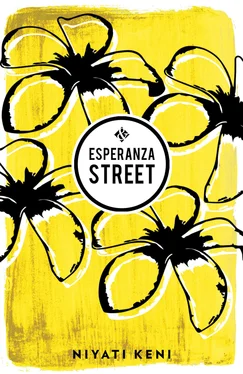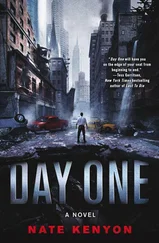Niyati Keni
Esperanza Street
Esperanza Street, May 1981
The rain came down. On Esperanza Street the hot-food vendors, already prepared with tarpaulins, called to one another in mock dismay as the rain hissed on their braziers and broke the crowds. A layer of steam rose from the ground and clung to the leaves of the cheesewood hedge that separated Aunt Mary’s boarding house from the commotion of the street.
I stood at the boarding-house gate and watched as the rain emptied Esperanza Street. Generally, our people didn’t run too hard to escape the monsoon rains; only the tourists, for whom such rains were a novelty, sprinted happily for cover. The rest of us knew that at the height of the season, over the course of a day, the chances of staying completely dry were slim, even with an umbrella. Later on, when the rains grew less frequent, people might work a little harder to avoid getting wet.
At the top of Esperanza, where it joined Salinas Boulevard, the fish vendors stopped pouring cups of water over lines of crab and milkfish and groupers and rolled back their canopies, if they had them, to let the rain wet their wares.
Nearby, a ripple of activity passed through the muddle of tricycle and motorcycle rickshaws grouped at the junction. The trike riders, all men, turned up their collars against the light wind that drove the rain along and reached down to unstrap umbrellas that were fastened to the cycle frames. Straightening up, they slotted the umbrellas into place and opened them out, securing the fabric domes with string. The men checked the lines for tautness with their thumbs before sliding back into their saddles or lounging in the sidecars, apparently asleep, but with eyes on the street, waiting for the fares the rain would inevitably bring.
I knew the rhythm of this street by heart. On the nearest corner, within eyeshot of our gate, Johnny Five Course would be wedging an umbrella into the boughs of the frangipani tree and leaning back against the trunk, his feet up on the wheels of his food cart. On the corner opposite, Abnor, short for Amos Balignasay Junior, sixty if he was a day, would be flipping up the wooden wings of his tea cart and sliding his stool underneath before slipping into the doorway of Primo’s store to share a cigarette with the man himself, perhaps making his long-considered move on the chess board atop Primo’s counter. Half a block along, in the direction of the sea, Cora would be hooking the sunshade down over the chairs in front of the Coffee Shak. At the bottom of the hill, Colon Market would be blossoming into a patchwork reef of awnings and umbrellas. And down at the jetty, my father and Jonah and the rest of the boys would sit it out under any shelter to be had or, if there was none, would squat on the sea wall, their shirts pulled over their heads and, laughing at each other, turn their faces up to the sky.
Esperanza, one of the oldest streets in Puerto, its heartbeat made up of thousands of smaller pulses, lulled us all with its apparent constancy. Yet even then, unknown to us, in a bright, air-conditioned office as close to our street as it was distant, a new and remorseless beat was gathering.
Spanish Colonial Architecture
I was eight when my father brought me to one of the big houses at the top of Esperanza Street and left me with Mary Morelos. Aunt Mary, as I called her, though we weren’t related, was from a good family, well known in the neighbourhood. At one time her family had owned much of Esperanza and the surrounding streets as well as estates up in the hills. However it was common knowledge that her late husband had been something of a gambler. Thousands of acres of sugar plantations and coconut groves were lost to the other landowners who formed Uncle Bobby’s poker crowd, until all that remained to his wife was the house and its garden and the freehold to a couple of stores further down Esperanza.
Relieved of her inheritance, Aunt Mary ran her home as a boarding house, the only one in Esperanza that charged per night; all the others had hourly rates, too. And she was fussy about whom she let stay: unmarried couples were acceptable; single women, Filipino or foreign, were usually welcome, but single foreign men, especially the older ones, especially the quiet older ones, she didn’t much like. She wasn’t above asking them to leave before they’d even settled in if she got a hunch about them. Her foreign guests were mostly Germans or Swiss with the occasional American. When she was younger she’d spent time in Europe and the States and so seemed at ease in almost any foreign company.
The Morelos house was a three-storey building constructed during Spanish times: coral stone for the ground floor, hardwood for the two above. It stood, at a slight angle, behind the neatest garden in the street. The garden, thick with greenery, was formal in design, planted in a European style but with the waxy, wayward leaves of the tropics. The trees and bushes were cut as standards, with caverns of cool, shadowed earth beneath them. Arching over the verandah, fingers of bougainvillea twitched in the rain.
My father brought me to the house with a small bundle of my things; nothing much — a change of clothes and some schoolbooks. I had on an old pair of slippers that had belonged to my brother which were too large for my feet, treacherous to walk in. I didn’t even have a toothbrush.
We called at the back door, by the kitchen. Aunt Mary asked my father to bring me into the sala, where she scrutinised me. She didn’t ask us to sit down and remained standing herself. My father removed his cap.
‘I haven’t the time to fix broken wings,’ she said. ‘Does he have any trouble with discipline?’
My father glanced at me before answering. ‘No, the boy can work hard when he puts his mind to it.’
I stood motionless in the centre of the room. The shutters were open but the cane blinds were lowered and the inside of the house was cool. The room smelled of dust and flowers and camphor. Aunt Mary frowned at me. ‘Do you have another pair of shoes?’ she said. I shook my head.
‘I’ll bring some,’ my father said hurriedly, as if my ill-shod feet might break the deal, but she waved his offer away.
‘Leave him here,’ she said.
I was sullen that day and for much of the first month, but I did work hard and with care. Just to make it clear that I was there to work, Aunt Mary set me to polishing the wood in the house straight away, and there was a lot of it: stairs and balustrades, and the heavy narra-wood furniture. She made me polish everything but the piano; she wouldn’t let me touch that at first. Everything was dusty; her previous houseboy had left over a week ago, heading back to his native village to cultivate the quarter-acre his father had left him and look for a wife.
Aunt Mary bought me new shoes and a toothbrush and tyrannised me into cleaning my teeth twice a day. In the evenings I was expected to do my schoolwork like her own boys. At night I slept next to America, the housekeeper, on a mat in the kitchen. America’s children and grandchildren were a long distance away, in a village to the west. She missed them and I suppose that worked out well for me because she clucked over me like a mother.
On my first day Aunt Mary called me over to her and said, ‘This is your chance, Joseph. Do you understand?’ I said yes because I didn’t want her to think I was ignorant. I expected I could mull it over in my own time and work out what she meant. Much later, it seemed so obvious. Puerto was a working port and a market town. It had its share of tourists, but they didn’t usually stay for long, preferring the long stretches of white beach to the north and south of town. The foreigners passed through now and again to renew their papers, visit banks or hire motorcycles on which to explore the hinterland when they tired of white sand and the sound of surf breaking out over the reefs. Some, usually men, came to stay for short stretches in the inns behind Salinas Boulevard, close to the shanties behind the Basilica de Nuestra Señora. There was something faded about these men, something careful and deliberate. They arrived in town, hired a room for a week or so, sat with warm beers at the Chinese bars, wilting behind sunglasses. From the sidewalk tables outside the bars, they faced outwards, towards Greenhills, glimpsing the nakedness of slum kids in the alleys. After a while they would leave for the beaches, sometimes with a local kid in tow. At first I envied these kids, imagining them fetching beer and folding laundry and being repaid for a few weeks’ work with training shoes, video-game consoles and money.
Читать дальше












